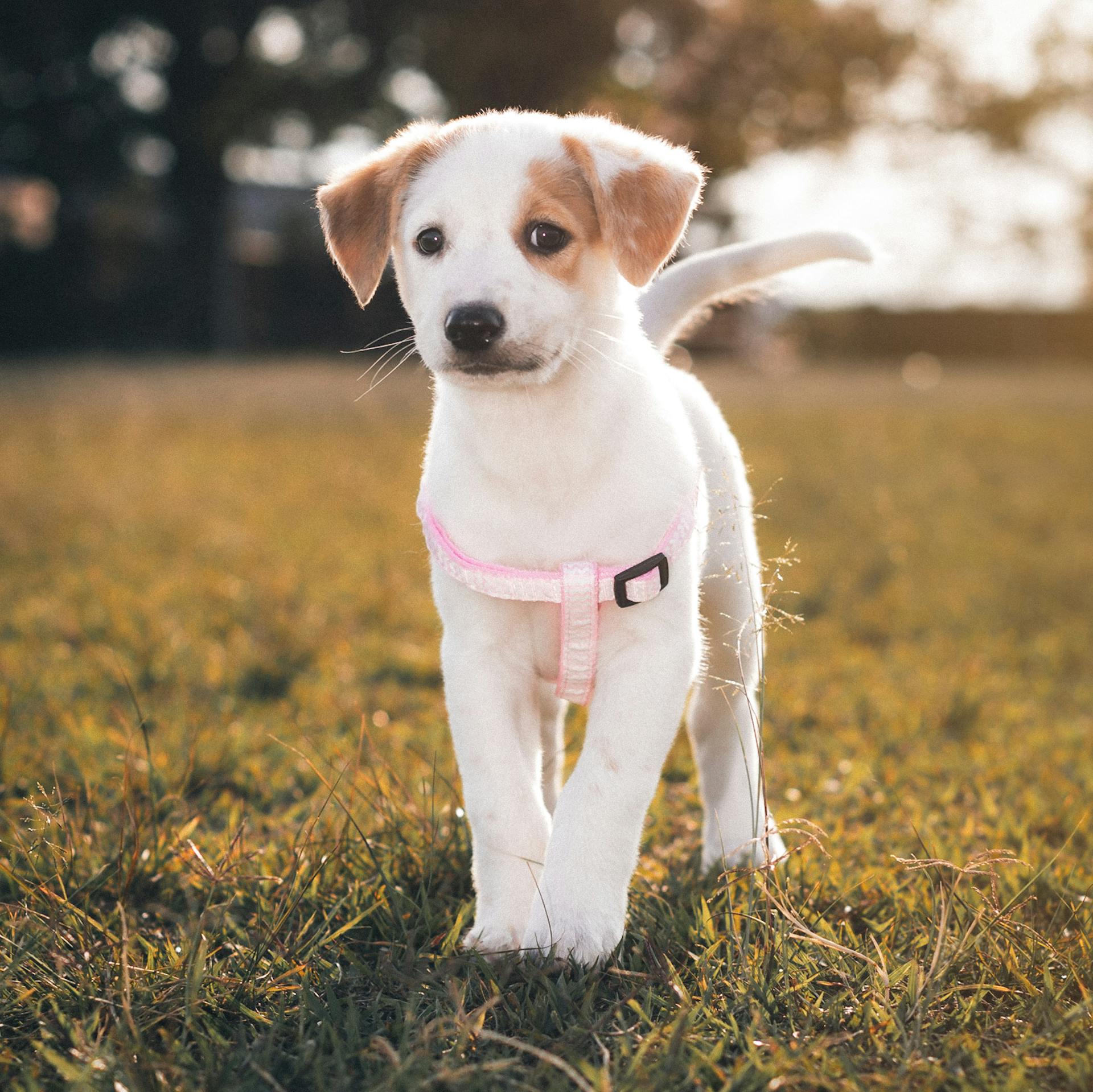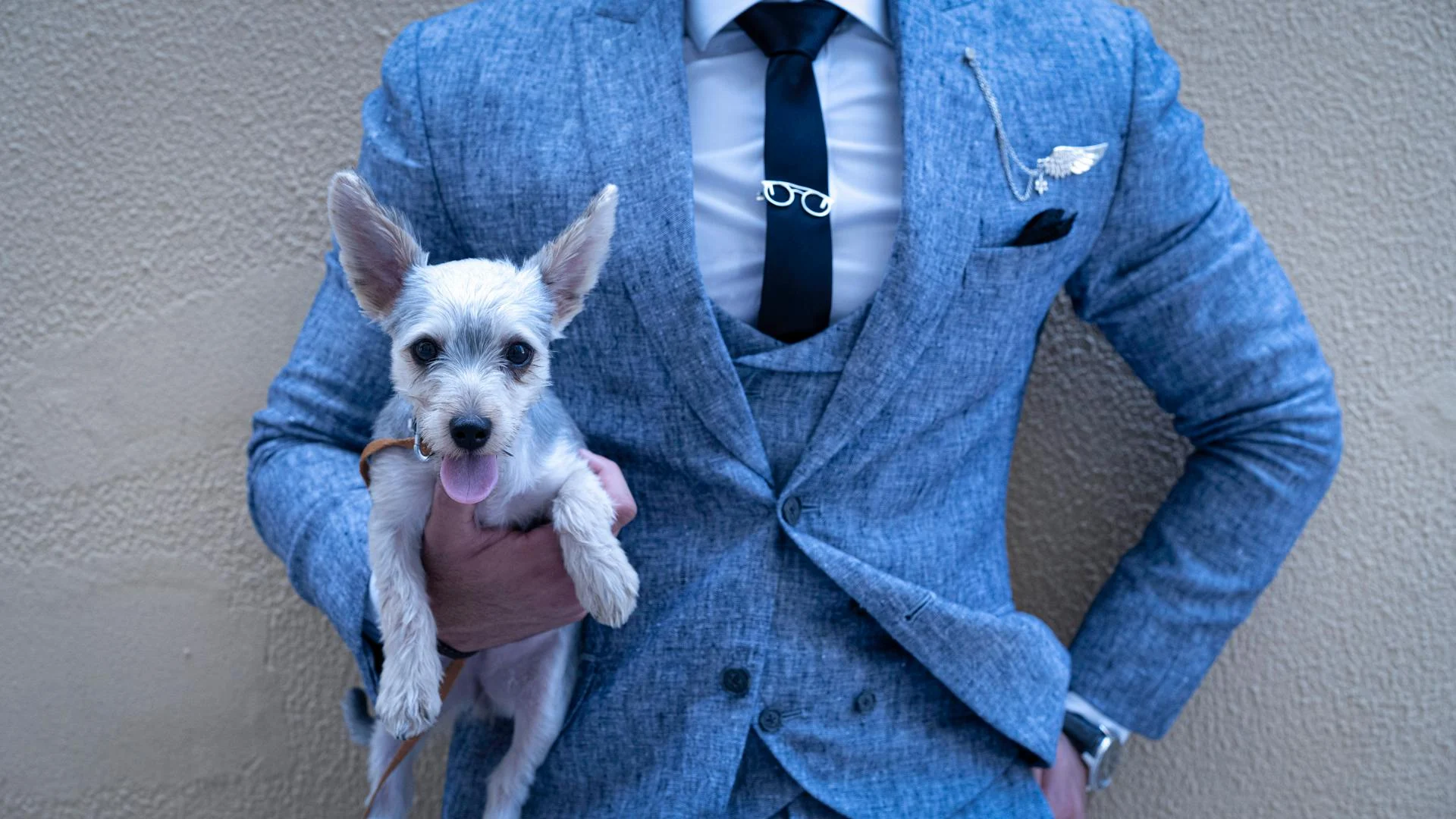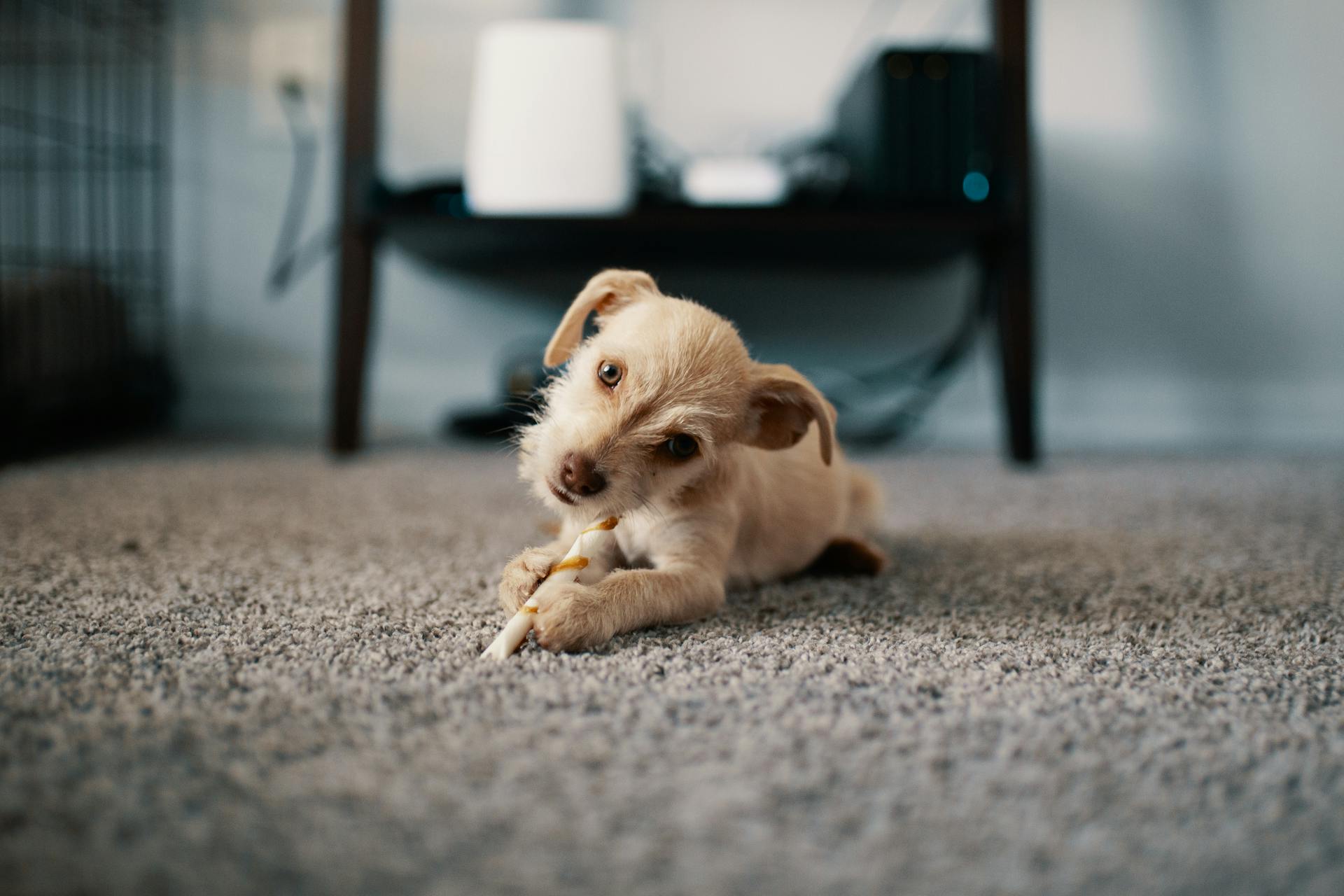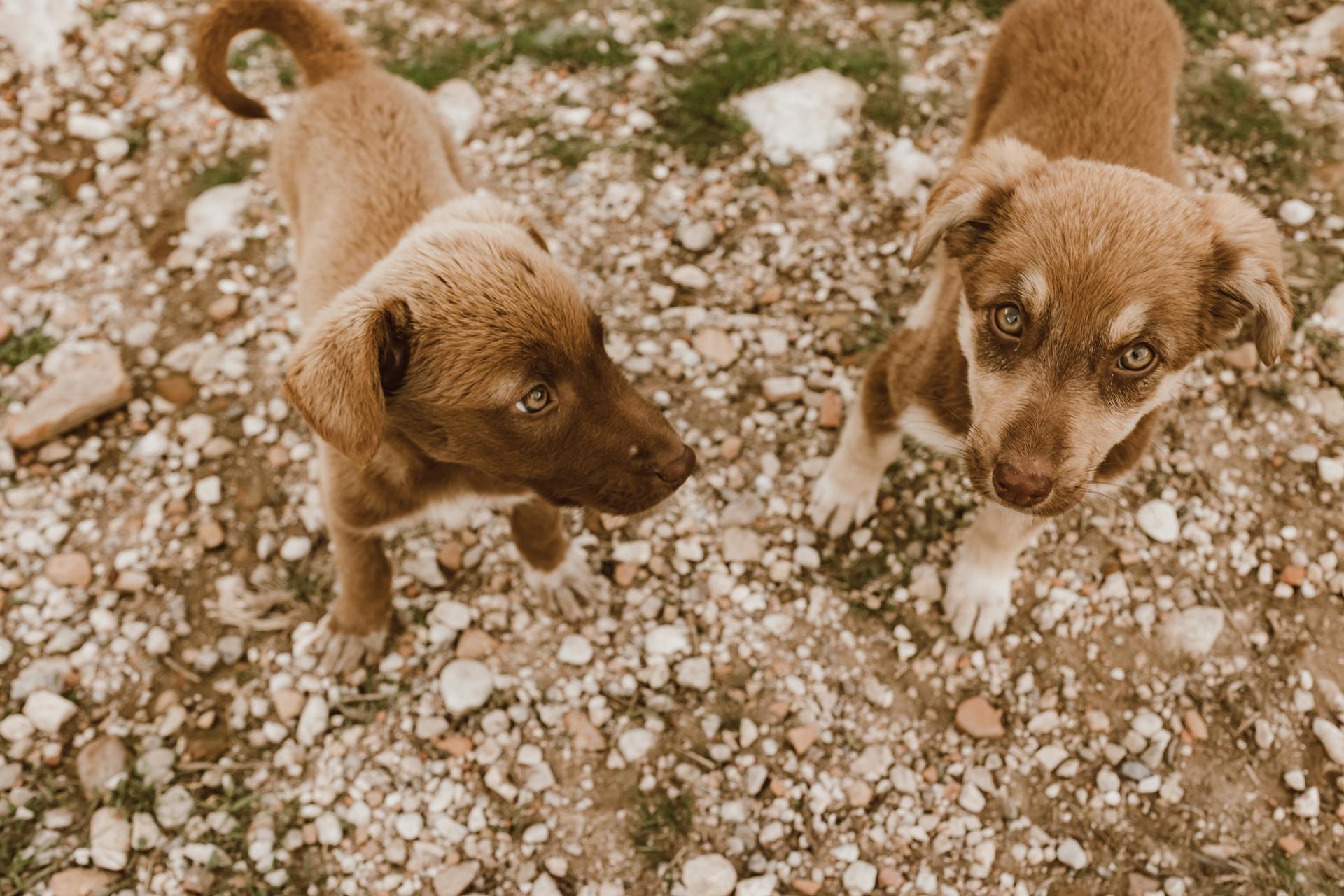
Respect training for puppies is all about establishing a strong bond between you and your furry friend. This bond is built on trust, consistency, and clear communication.
By teaching your puppy to respect you, you're creating a foundation for a lifelong relationship based on mutual respect and trust. A puppy that respects you is more likely to listen to you and behave well in public.
Establishing clear boundaries and rules is key to respect training. This means setting clear expectations for behavior, such as not jumping up or pulling on the leash. Consistency is crucial, so make sure all family members are on the same page.
Consistency also means following through with consequences when your puppy misbehaves. This doesn't mean punishing your puppy, but rather redirecting their behavior and providing a clear alternative.
Suggestion: Aggressive Behavior in Puppies Training
Puppy Learning Basics
Puppies learn things every minute they're awake, and it's essential to be mindful of what they're picking up from us.
Every time you do something with your puppy, he learns something about you, whether it's a reaction or a non-reaction.
Puppies learn from our reactions, and it's crucial to be consistent in what we allow and what we don't.
They can learn that barking gets them out of their crate, whining pitifully gets them treats, or that the kids keep chewable toys in their bedrooms.
A puppy's learning is accelerated when they're consistently rewarded for good behavior, whether it's with treats, praise, or affection.
Here are some common behaviors that puppies learn from our reactions or non-reactions:
- Barking gets them out of their crate
- Whining pitifully gets them treats
- The kids keep chewable toys in their bedrooms
- Jumping on people makes them pet them
- Pushing their head into someone's lap makes them pet them
By being aware of what our puppies are learning, we can take control of their behavior and shape them into well-adjusted, respectful companions.
Object Interaction
Object Interaction is a crucial aspect of respect training for puppies. This behavior can be a challenge for many puppy owners.
Your puppy may exhibit possessiveness over objects, refusing to let go when you try to take something away from them. This is especially true if it's something they want to keep for themselves.
You may notice your puppy bracing their legs and refusing to let go of an object, making it difficult to take it away. This behavior is a clear indication of a possessive puppy.
As you work on respect training, be prepared for your puppy to become attached to certain objects, and be willing to patiently take them away to teach them it's okay to let go.
Respect Training
Respect training is a crucial part of raising a well-behaved and obedient puppy. It's essential to establish a strong bond with your puppy and teach them to respect you and others.
Training your puppy should be a fun and easy adventure that strengthens your bond with your canine companion. By providing activities that stimulate interest and exercise, you can prevent behavioral issues and destructive behavior.
Puppies learn things every minute they're awake, so it's essential to be mindful of what you're teaching them. Every time you do something with your puppy, they learn something about you, and every time they try a behavior, they learn something from your reaction.
Teaching a puppy respect training is easier and takes less time than teaching an older dog, but it's possible. The first step is teaching your dog simple obedience, which can be done in 10 to 15 minutes a day without any interruptions.
Here are some essential steps to teach your puppy respect training:
By following these steps and being consistent, you can establish a strong bond with your puppy and teach them to respect you and others. Socialization from an early age is also critical in teaching your puppy to respect other dogs.
Respect training doesn't have to be stressful; it takes patience, a few treats, and a bit of time. With the right approach, your puppy will feel happy and safe with you, and you'll have a best friend who behaves.
Establishing Pack Hierarchy with Your Dog
Establishing pack hierarchy with your dog is crucial for respect training. It's not just about being the boss, but about being a leader your dog respects and follows.
Worth a look: Masterclass Dog Training
You demonstrate leadership by interacting with your dog in specific ways – small actions that equal guidance and direction. This includes body language, tone of voice, and how you respond when your dog does something.
To establish pack hierarchy, you need to set boundaries and limitations while creating a fun learning experience for your pup. This means teaching your dog what's allowed and what isn't, and making sure they feel protected.
Teaching a puppy respect training is easier and takes less time than teaching an older dog, but it is possible. The first step is teaching your dog simple obedience.
Here are the basic steps to follow:
- Find a spot where you can work on obedience training for 10 to 15 minutes a day without any interruptions.
- Grab some of your dog's food or favorite treats and a leash.
- Tell your dog "heel" and lead them with a treat while keeping hold of the leash.
- Give it a gentle tug to encourage your dog to follow, but don't yank on the leash.
By following these steps and consistently applying them, you'll be able to establish pack hierarchy with your dog and lay the foundation for respect training.
Training Fundamentals
Training your puppy is not just about teaching them basic commands, but also about establishing a strong bond and setting boundaries. Training is a way to learn while having an easy and happy adventure with your pup.
Puppies learn all the time, and you can't stop them from learning things. Every time you do something with your puppy, they learn something about you.
To prevent behavioral issues and destructive behavior, training is essential. It helps to entertain and mentally stimulate your pup, keeping them happy and healthy. Proper training also helps to protect your puppy from serious and deadly situations.
You can't expect your puppy to listen to you if they don't respect you. Once your puppy recognizes you as pack alpha, you'll be able to lay down the rules and have them jump to follow your orders – no yelling or pleading necessary.
Here are some key takeaways to keep in mind:
- Teach your puppy what's allowed and what isn't.
- Discipline bad behavior.
- Make sure your puppy feels protected.
- Be firm and consistent, but never be aggressive.
- Spend quality time together.
By following these tips and being mindful of what your puppy is learning, you can establish a strong foundation for respect training and a lifelong friendship with your furry companion.
Socializing My Dog with Other Dogs
Socialization from an early age is critical, but it's never too late to start. Still, sometimes even older dogs can become more comfortable around other pups.
To introduce dogs who will be living together, put the new dog in a separate room during the introduction phase. This helps prevent territorial behavior.
Meet somewhere neutral, like a park, to introduce dogs and avoid territorial behavior. Neutral spots like parks are ideal for this purpose.
Allow the dogs to make the moves toward one another, don't force it. You might even start with parallel walks where the dogs don't interact at all but peacefully co-exist on the sidewalk.
Offer treats for positive behavior, like when the pup lies down or calmly approaches the other dog and interacts well. Give a treat, ear rub, or praise to assure your pet they're doing well.
If the interaction isn't going well, end the meeting and try again later. This will help prevent any further stress or anxiety for your dog.
Here are some key steps to remember:
- Meet in a neutral location
- Allow dogs to make their own moves
- Offer treats for positive behavior
- End the meeting if interaction isn't going well
Following Commands
Following commands is a crucial part of respect training for puppies, and it starts with understanding that dogs feel secure when they know what your "human sounds" mean.
Learning a new language, including your dog's language, gives them confidence and empowerment.
Dogs thrive on a relationship where they look to you for guidance, direction, and permission.
Be Firm and Consistent
Teaching your puppy to respect you is crucial for a harmonious relationship. Yelling at your dog is the human equivalent of barking at them, so it's best to avoid it.
Be firm and consistent in your training, as this will help your puppy understand what's expected of them. Consistency is key when training a puppy.
Grabbing your puppy by the scruff of their neck is an effective training technique that doesn't harm them. Picking up a puppy by the scruff and firmly telling them "no" is a way to establish your position as pack alpha.
As your dog ages, you can still use this technique, but be gentle and avoid picking up an adult dog this way.
Discover more: Training Labrador Puppies
Frequently Asked Questions
What is the proper way to discipline a puppy?
To discipline a puppy effectively, be consistent, firm, and calm, addressing issues as they happen and rewarding good behavior. Consistency and positive reinforcement are key to teaching your puppy good manners and preventing behavioral problems.
What manners should I teach my puppy?
Teach your puppy basic manners like respecting personal space, gentle interactions, and calm behavior in public. This includes not jumping up, biting, or chasing, and being mindful of social boundaries.
Sources
- https://www.yourpurebredpuppy.com/books/RTP.html
- https://www.yourpurebredpuppy.com/training/articles/dog-respect-training.html
- https://alldogsdream.com/the-importance-of-respect-training-for-puppies%EF%BF%BC/
- https://www.dogstardaily.com/book/export/html/1177
- https://www.pawtracks.com/dogs/dog-respect-training/
Featured Images: pexels.com


